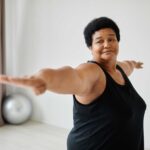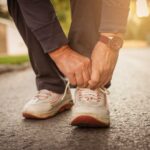
02 Feb Better Sleep for Better Recovery
When you think about all the ways you can help your body stay healthy and even improve recovery from exercise and injury, it’s easy to automatically think about drinking more water and eating your fruits and veggies (which you should also do); however, most of us miss the simplest way to help our bodies do better: get more sleep.
Although the pandemic has caused a shift for some to remote work, even now people aren’t getting enough sleep. We stay up late to catch up with favorite shows or scroll through our social media, or sometimes because sleep itself is elusive. Then we wake up early, in time for work and to start the whole process over again. Missing sleep during the week isn’t something you can just ‘make up’ on the weekend, either. Being chronically sleep deprived has been linked to higher risks of:
High blood pressure
Diabetes
Obesity
Depression
Heart disease/stroke
When you’re recovering after a hard workout or from an injury, sleep is when your body repairs itself. By skimping on sleep, you’re really just short-changing yourself. The time you gain by staying awake longer isn’t time that your body utilizes toward repair. It can be even more frustrating when you want to sleep but find it hard to get there; stress, hormonal fluctuations, medication, and other factors can all lead to more struggle than sleep at bed time.
How to Help Improve Your Sleep Routine: 
It’s called sleep hygiene, the same way you’d refer to taking care of your teeth as dental hygiene – and it refers to improving the routines and conditions around your sleep. Here are five helpful tips to work on improving your sleep and getting more of it:
- Log off all devices an hour before you plan to go to bed. The type of light emitted by laptops, phones, tablets, and other devices is a light that tells our brains to ‘wake up!’ – which is the opposite of what you want right before bed. Investing in blue-light blocking glasses can also help.
- Keep your bedroom dark and cool. Having a dark, cooler bedroom is a signal to our brain/body that it’s time to rest. It’s harder for us to sleep when our bodies become too warm; in the winter, adjusting blankets can be enough to make sure you’re comfortable.
- Keep your bedroom a ‘sleep only’ zone. If you’re working remotely, it might be tempting to plug away on your laptop from your room; however, associating your bedroom with work is one way to not associate it with rest and sleep. Keep your work in another room, along with video games, and other electronics if possible.
- Create a bedtime routine. Develop a calming routine every night before bed. Listen to relaxing music, read a book, take a bath, do some light stretching, etc. Over time, your brain and body will come to associate your routine with unwinding and getting ready to go to sleep.
- Set a bedtime alarm. If you find it hard to pry yourself away from your TV, phone, or off the couch, set a bedtime alarm on your phone or watch – and set it for earlier than you think you need to. By the time you putter around letting the dog out, grabbing laundry, and turning lights off, it’s later than you think!
*Bonus tip: If you’re having trouble sleeping, don’t stare at the clock. You’ll only get frustrated that you’ve been trying to sleep for ten minutes, now it’s twenty, and so on! Get up, do something quiet and unstimulating (read a book that isn’t very interesting) or drink some decaffeinated tea until you start to feel tired. Then try again!
It happens without fail; patients talk about how ‘tired’ they are and yet they’re trying to get better and working hard on recovery. Working on the simple step of adding better sleep to your life can pay off in numerous ways. Think about the last time you slept really well: how did you feel different? Did you have more energy? Did you feel less stressed? By making some basic changes and getting more sleep, you may change the way you feel and the way your body performs.
At Body One PT, we work with patients to improve their function, movement, and mobility as well as decrease pain and discomfort. We’re both locally owned and operated, with three locations serving Central Indianapolis: North Indy/Carmel, Fishers, and Zionsville. Read what makes us different here. If you’re ready to work with the Best PT Team in Indy, call or click today!
Sources:
https://www.ncbi.nlm.nih.gov/books/NBK19961/#:~:text=The%20cumulative%20long%2Dterm%20effects,%2C%20heart%20attack%2C%20and%20stroke.




